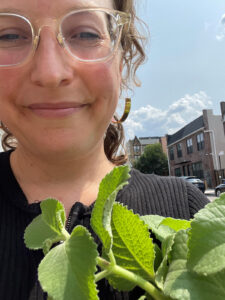It was a freezing winter day in 2013 when Lindsay Ferguson first visited Hawthorne Valley Farm (HVF). She was considering joining the team as a Whole Farm Apprentice, and distinctly remembers frost covering the barn windows. For a Florida native who’d been working on farms in California, the Northeast winter might have been a deterrent. But the livestock team at the time—Kelly O’Hearn and Andrew Whitby—were so warm and welcoming that she knew she wanted to stay and learn dairy farming from them.
 Lindsay has always been an animal lover, and became comfortable around farm animals as she spent time at the farm where her father worked as an agricultural researcher. Her time working at HVF and other grass-fed livestock operations have only deepened her love for dairy cows.
Lindsay has always been an animal lover, and became comfortable around farm animals as she spent time at the farm where her father worked as an agricultural researcher. Her time working at HVF and other grass-fed livestock operations have only deepened her love for dairy cows.
“[They] are just so cool, especially when they’re really tied to the seasonality of a place and landscape,” she says. “[The relationship] can feel a bit transactional if you’re just milking them, but cows have this other part of their life where you get to see them being their most cow selves in the pasture. You get to see their personalities, and it’s a special thing to witness the inner lives of animals and how much individuality they have.”
Following her apprenticeship at HVF, Lindsay spent the next ten years working at various grass-fed dairy farms in the Hudson Valley, including fellow Biodynamic® farms TriForm and Churchtown Dairy. She continued to fill in as a milker at HVF as well.
Then in 2018, Lindsay decided to make a shift from farming and return to school to pursue a Master’s in Social Work. While she was earning her undergraduate degree, she’d worked in a palliative care program for adolescents at a university hospital in Florida and had known that she would circle back to that kind of work at some point in her life. Today, she works as a crisis response therapist for adolescents in New York City.
Lindsay feels her time in farming helped her build valuable skills, including team work, camaraderie, and crisis management. On a different, and equally important, level, she feels that being a farmer prepared her emotionally for her work with adolescents in crisis.
“You get this closeness with the life cycle as a farmer—the loss and then rebirth,” she says. “I didn’t really have spiritual or emotional fortitude as a 19 or 20 year old. As a farmer, whether you’re putting time and care into crops or deeply caring for the animals you’re raising, those lifespans happen on a different timeline than human life. And after 10 years of farming, I was able to build more comfort with death and being able to let grief and gratitude coexist with each other and inform how I exist from day to day.”
While that fortitude enables her to meet the hard days on the job, Lindsay says she doesn’t have to rely on that every day.
“I love working with the kids,” she says. “It’s a tough job, but it’s also really rewarding. It’s super fun most of the time. When the stressful times do come, I’ve hopefully built up enough of a relationship with the kids and their families in the calmer times that I can be really present for them in those moments.”
